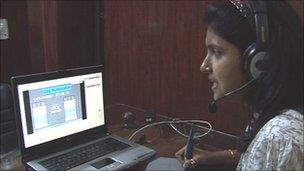UK school enlists Indian maths tutors online
- Published
Howard Johnson visits the TCYOnline call centre in India to see how they teach maths
Pupils at a north London primary school have been improving their maths - thanks to the internet which has put them in touch with teachers thousands of miles away in India.
"It's a 3D shape." "Wait, I'm not sure if that's a square." "Oh, I know, it's a rectangular prism, a pyramid." "Is it a cuboid?"
These are snippets of overheard conversations in a classroom at Ashmount Primary School in north London, as Year 6 pupils don headphones and study shapes with their maths tutors in India.
The pupils have been using an online one-to-one tutoring scheme - organised by a British entrepreneur - which links them to tutors more than 4,000 miles away in the city of Ludhiana in India.
But the scheme has proved controversial, with teachers' unions fearing outsourcing teaching may erode standards in the classrroom.
The lessons are booked at least 24 hours in advance, and at the agreed time, pupils log on and interact with their tutor on the screen, which works rather like an interactive whiteboard.
The sessions, designed for children aged between seven and 16, cost £12 an hour and schools - or parents - sign up for a block of two or five lessons.
The pupils at Ashmount are enthusiastic about this computer-based way of learning.
Adam, 10, says: "It's fun because it's on the computer and not doing it on your books."

The tutors teach using online technology similar to an interactive whiteboard
"It's fun because you're talking to someone from somewhere else," adds Rosa, 10.
"I like it a lot," says Bedran, 10. "They taught me a lot of maths, I learnt good stuff, I know my maths better now."
"It's really good because when you're in class doing maths, you don't really want to pay attention because the teacher's right in front to you," says Aliyyah.
"But now it's on the computer and you're talking to someone in India and you don't want to waste that opportunity."
Innovative teaching
The children's enthusiasm for these one-to-one online lessons, which are run by the Bright Spark Education company, is matched by the tutors themselves.
All 100 tutors in India are maths graduates, are familiar with the national curriculum and undergo security checks.
They are paid £7 an hour - which the company says is three times the average wage locally for a skilled worker.
Tutor Austin Cole, 28, enjoys teaching in this way, saying it is an innovative way of helping pupils learn.
"I can't see the student, but I can talk. I can chat with them so it's a different way of teaching and as effective as with the classroom - even more effective, so that's what I like about it."
But does he feel his skills are being exploited by Westerners, who would normally expect to pay a lot more for one-to-one tuition?
"Our cost of living is different to the UK," says Austin.
"We think it's really good for us because we're here in India, not in UK. Still, we are earning more than the teachers here are earning.
"So such feelings [of exploitation] never come into our minds," he says.
'Doing away with teachers'
Tutors and pupils may be enthusiastic about the scheme, but teachers' unions have criticised it, saying schools should focus their resources on empowering classroom teachers to raise standards.
Children from Ashmount Primary School give their views on the new way of teaching
Chris Keates, general secretary of the NASUWT union, says the approach is wrong.
"Why aren't teachers making sure that they teach these pupils themselves, rather than go for remote learning from India?," she asks.
"I am concerned about the precedent this is setting. What next - do we do without maths teachers?"
The National Union of Teachers also criticises the idea, saying it is not the way to ensure "consistent and good quality" teaching in schools.
But for Rebecca Stacey, assistant head and year six teacher at Ashmount Primary School, online distance learning is not about replacing teachers, but providing an extra resource.
Miss Stacey says that rather than offering the tutoring to the whole class, she has used it for particular children who need some extra assistance.
"We wanted something that would target individual pupils and give them one-to-one help," she says. "We wouldn't be doing it if the standard wasn't up to it."
The tutoring can be equally well targeted at gifted and talented maths pupils, she adds.
Tom Hooper, a London-based entrepreneur who founded Bright Spark Education, also rejects criticism that the tutoring scheme is a threat to classroom teaching.
"It's just a supplement to help kids with their maths, to complement what they're learning in the classroom.
"It's just one technique, amongst others, that the teachers can employ."
- Published28 September 2010
- Published17 September 2010